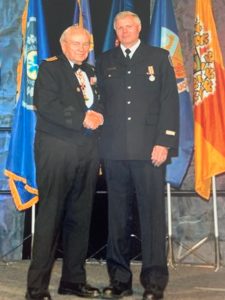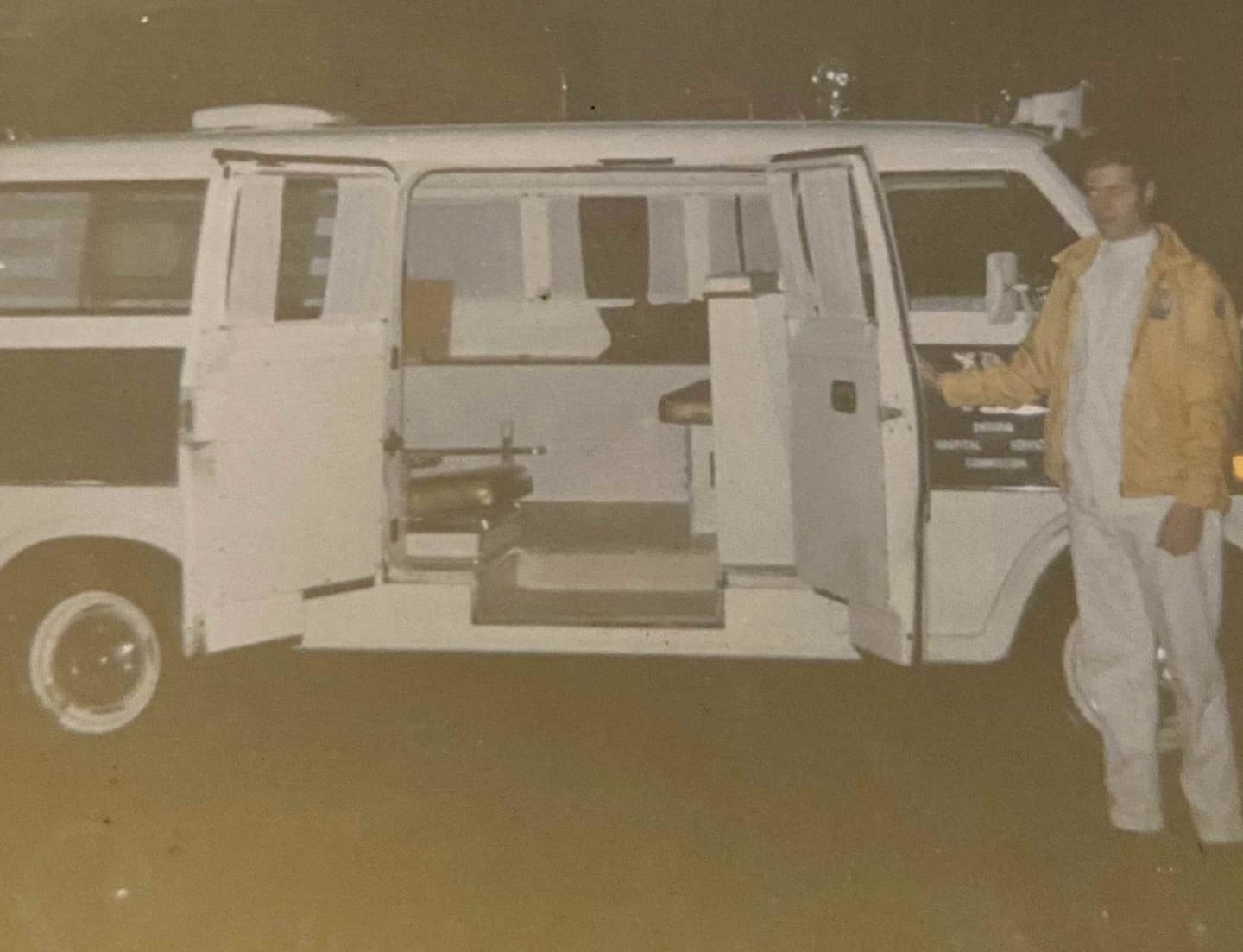On Dec. 17, 2020, Hastings-Quinte paramedic Graham Christie signed off for the final time after 50 years of dedicated service to the emergency medical community.
“4363, 79242 signing off.”
After a brief pause, the dispatcher’s voice came over the radio.
“Paramedic Graham Christie, today we celebrate your life dedication to the paramedic profession with your last shift prior to retirement,” the dispatcher said. “You started your career in June of 1969 – you have given over 50 years of paramedic service. Many paramedics were not even born yet while you were providing emergency medical care to so many patients.”
The emotional video of Christie’s final sign-off, posted on Hastings-Quinte Paramedic Services (HQPS) Chief Doug Socha’s Twitter profile, has since gone viral with more than 750 likes and nearly 150 retweets.
“Graham is a great paramedic and I have worked with him a long time as a medic and then in this capacity,” says Socha. “I knew that [the video] would get a lot of attention but certainly did not expect the level it received. I think it really shows across the paramedic profession the comradery and respect others have in what he accomplished.”
Christie says he’s not the kind of person who likes to be first in line, and that he could never have guessed that his final sign-off would have garnered so much attention. He adds that watching the video is a bittersweet experience.
“I like to do things to get them done, but I’m not one to stand up and beat my chest,” Christie says. “I did watch the video and read all the comments, and I appreciate the well wishes. Truthfully, I didn’t really want to leave. But it was time.”
Socha says Christie was hired on with HQPS on September 21, 2006, and enjoyed a 14-year stint with his fellow paramedics in Hastings County. However, his career began in 1969 when he got a part-time job straight out of high school, performing emergency medical services for the Hotel Dieu hospital in Kingston. Hotel Dieu was one of the first hospital-based ambulance services in Ontario. Christie says he was a pioneer in the sense that prior to 1968, all ambulance services were privatized. Only a year before Christie joined the workforce, paramedicine became a public service under contract with the Ministry of Health and Long-Term Care.
Christie stayed with the Hotel Dieu for 10 years and then moved on to become the coordinator for the Ambulance and Emergency Care program in Sudbury for three years.
“I decided that really wasn’t what I wanted to do, so I came back to Kingston,” he says. “I missed the people, more so than anything else. And my family was all there. Then in the early 70s I didn’t think I knew enough about paramedicine, so I went into nursing at the Nightingale School of Nursing in Toronto.”
After obtaining his diploma, Christie says he worked as a nurse in emergency departments and in community nursing for five years each, on a part-time basis. However, it wasn’t meant to last.
“My nursing director was quite upset when I decided to go back to ambulance, but there was just something about it,” he says. “It was my passion. You meet new people every day, and in a lot of cases you get to do the best you can to get them through their very worst time. If that can make you satisfied, that’s what you do. I couldn’t see myself doing anything else.”
Socha says before working with Christie as his Chief at HQPS, he was lucky enough to work with him as a paramedic when they were both with the Kingston Regional Ambulance Service in 1996.
“I had the pleasure of being able to really learn from his experience,” says Socha. “Every paramedic knows how difficult it is to have a career that spans 50 years.”
 Socha says Christie’s ability to physically and mentally maintain a career providing emergency medical care is a real testament to his character and professionalism. According to Socha, when Christie’s career first begun, paramedics would not have had access to power stretchers or power loading devices to assist with loading patients into the back of the ambulance, both important resources that help make the job just a little easier for today’s medics.
Socha says Christie’s ability to physically and mentally maintain a career providing emergency medical care is a real testament to his character and professionalism. According to Socha, when Christie’s career first begun, paramedics would not have had access to power stretchers or power loading devices to assist with loading patients into the back of the ambulance, both important resources that help make the job just a little easier for today’s medics.
“Some of the early ambulances didn’t even have seatbelts,” Socha says.
Christie agrees, adding that a lot has changed over the past 50 years aside from only the technology, a major thing being the training. “When I started, I had a first aid certificate and a driver’s license,” he says. “People don’t believe that, but it’s how we started out in the 60s. Now there’s a lot more education involved.”
Today, the average length of a basic post-secondary program in paramedicine is two years. To become an Advanced Care paramedic, candidates must undergo a three-year program. This means that over the course of his career, Christie had to adapt and retrain frequently to keep up with the changing requirements.
“When I started, it was a young man’s profession,” Christie says. “You didn’t have the fire department on auto extrication, or lift assist. You had to do a lot of things yourself. You had to pick the patient up from the ground and put them in the back of the vehicle, which doesn’t sound very hard, but you had to have the strength to do that.”
Today’s power stretchers and ambulance loading devices have the capability of lifting up to 700 pounds.
“The strength isn’t as necessary now as it was when I started,” Christie adds, “but the health and safety aspect with the new stretchers has certainly been much better.”
Paramedics are exposed to trauma on almost a daily basis. This comes with a certain degree of operational stress, in fact, the Mental Health Commission of Canada reports that paramedics in Canada are four times more likely to experience issues with mental health than the general population. According to a 2017 report published in the Canadian Journal of Psychiatry, symptoms of operational stress injuries only increase with more years of service and more exposure to these traumatic events.
“There were times when it was stressful,” says Christie. “and you have to have a good partner to de-stress after the call, but I was lucky to have really good partners that I could open up to. You have to be able to talk to your partner, it’s like a marriage. You see them more than your wife or girlfriend, you’re with them at least 12 hours a day for your rotation and you go through stuff together that no one else will really understand.”
According to Socha, with Christie having retired there are big shoes to fill at HQPS. He says that Christie’s number one priority was always the patient, and his focus of care was to deliver the highest medical standards. For this reason, Socha says that younger paramedics looked to Christie as a seasoned veteran who was living proof that despite the challenges faced by paramedics every day, it is possible to have a long and fruitful career delivering emergency medical care.
“He was always keen to offer solutions to other medics pulling from his vast experience,” Socha says. “He was always kind to patients, held an extremely high standard of himself and the paramedic profession, and when working with him you wanted to maintain that high level.”
Christie is quick to add that although he has retired from pre-hospital care, he has no intentions of slowing down. He has retained his teaching position at Queens University, training the next generation of paramedics in advanced life support. He also works with the Safety Team at the Calabogie Motorsports Park, which travels on occasion to other tracks in Shannonville and Bowmanville. To him, retirement is not the end; it’s simply the next step.
“The problem with retiring is that once you retire, people think you’re old,” Christie says with a laugh. “There’s a lot of ageism in retirement. They think you’re not able to keep up and keep doing what you’ve been doing for the last 50 years, but I’m not down for the count yet.”
According to Christie, if he could offer any advice to the younger paramedics with their entire careers still ahead of them, it would be to do it for the passion, not the money – and to make sure that they are satisfied with coming to work every day.
“Paramedics make good money, and I think that’s why a lot of people are getting into it,” he says. “If you’re not happy and you don’t have the passion, it’s time to change careers. I had a good time getting to work, I loved being there. There were some days where I didn’t really want to go, but once I got there, I was there to have a good time. If you can’t do that, you either have to change services or change what you want to do, because you’ve got to be happy with what you’re doing with your life every day.”
***
PHOTO CREDITS: Submitted by Graham Christie

Victoria St. Michael is a multimedia content creator with experience producing high-quality print and digital content. Victoria graduated with an Honours Degree in Digital Journalism from the University of Ottawa and a Journalism Diploma from Algonquin College, and has bylines in publications across North America. With an avid interest in humanitarian and global issues, she hopes to use her unique voice to help build a well-informed, forward thinking and progressive Canada.


